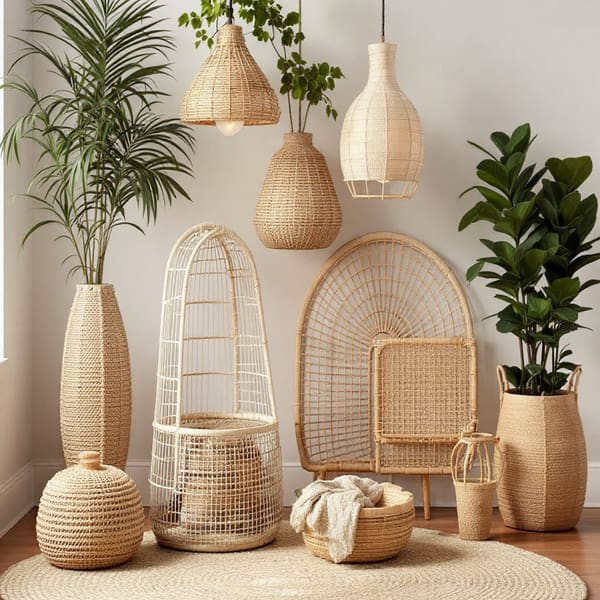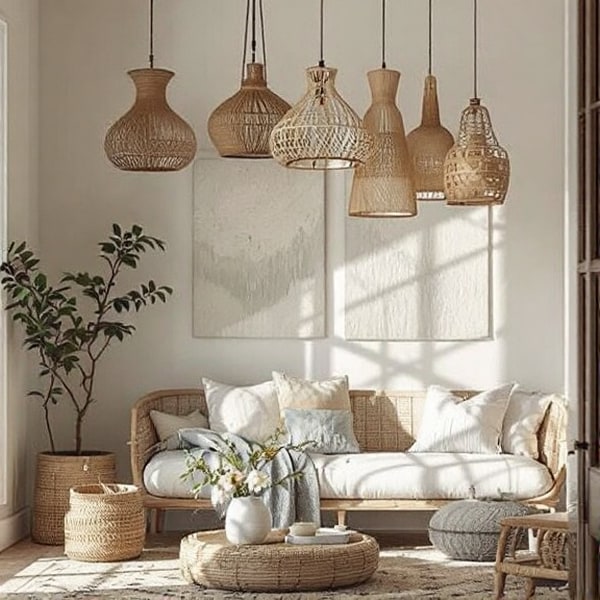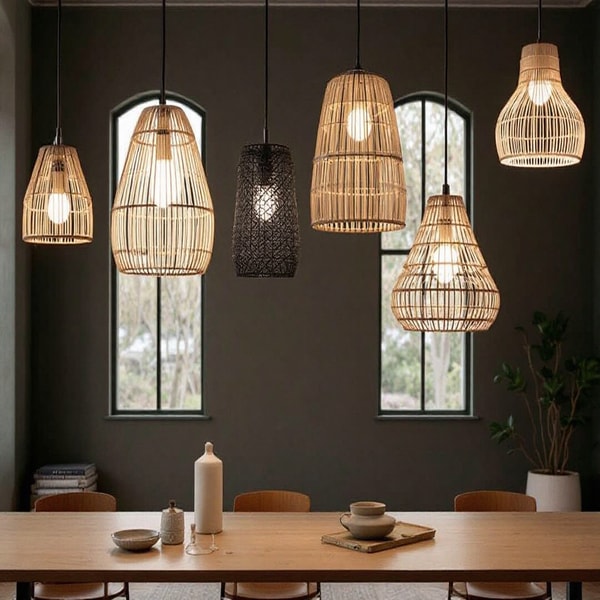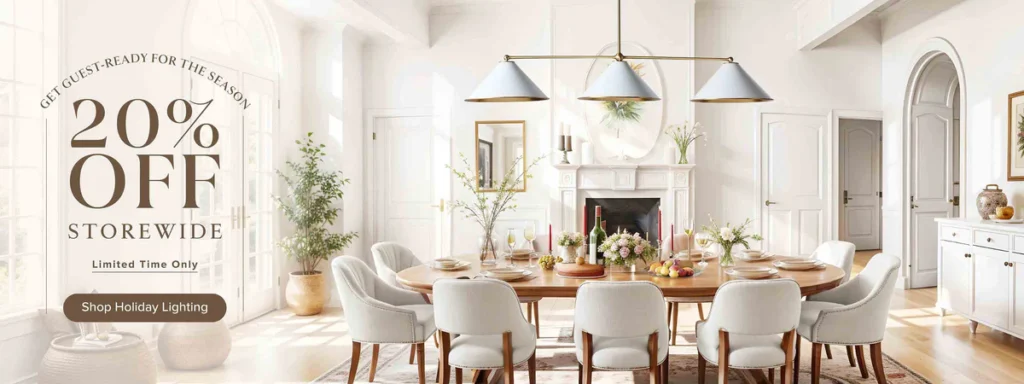The Different Types of Rattan Used for Pendant Lights encompass Natural Core Rattan, Split Reed Construction, Hybrid Metal Combinations, and Natural Fiber Blends. Each type offers unique characteristics for lighting applications, with Natural Core providing traditional durability, Split Reed enabling intricate patterns, Hybrids offering contemporary versatility, and Fiber Blends creating sustainable alternatives.
At Lighting a Greener Future, we’re passionately committed to illuminating your spaces with sustainable beauty. The artistry of rattan pendant lighting continues to captivate our design sensibilities while championing environmental consciousness. Let us guide you through the fascinating world of rattan pendant lighting.
The Different Types of Rattan Used for Pendant Lights
Natural rattan brings unique character to every space through its organic variations and timeless appeal. The transformation from raw material to finished fixture represents a perfect harmony of form and function.

Handwoven Natural Core Rattan
The traditional craftsmanship of Natural Core Rattan creates lighting that tells a story. Each piece transforms from rattan vine into processed strips, showcasing the artisanal skills passed down through generations. These fixtures embody the essence of sustainable luxury.
While the natural beauty of rattan is undeniable, understanding the distinct characteristics of natural versus dyed rattan materials can help you make an informed choice for your space.
Split Reed Rattan Construction
The Split Reed technique elevates ordinary spaces into extraordinary havens. This method allows for intricate shadow patterns while maintaining structural integrity. I firmly believe that split reed construction, despite its complexity, offers superior durability compared to simpler weaving methods. The proof lies in its long-term performance and adaptability to modern design demands. Our extensive testing confirms that properly treated split reed rattan can maintain its beauty for decades.
Hybrid Rattan-Metal Combinations
The fusion of natural fiber with metallic elements creates stunning contemporary pieces. These combinations offer remarkable versatility. The structural support of metal enhances the rattan’s natural beauty. Modern designers increasingly incorporate these hybrids into minimalist spaces. The contrast between organic and industrial materials produces visually striking results. The innovative approach opens new possibilities for architectural lighting design.
Natural Fiber Blends
Sustainable material choices include creative combinations of rattan with other natural fibers. Have you considered how different fiber combinations could transform your space? The possibilities are endless. Our research shows that blending rattan with seagrass or bamboo creates uniquely resilient structures with enhanced aesthetic appeal.
Design Variations and Applications
The versatility of rattan pendant lights spans from coastal retreats to urban sanctuaries. Each application demonstrates the remarkable adaptability of this timeless material.
| Style | Ideal Setting | Key Features |
|---|---|---|
| Coastal | Beach homes | Open weave, natural tones |
| Modern | Urban lofts | Geometric patterns, clean lines |
| Traditional | Country houses | Dense weave, warm finish |
| Industrial | Converted spaces | Mixed materials, bold contrasts |
| Minimalist | Contemporary homes | Clean silhouettes, simple patterns |
The visual impact of your chosen rattan material significantly influences the overall aesthetic of your space. Learn more about how different rattan materials affect pendant light appearance in our detailed analysis.
Spherical and Bell-Shaped Patterns
Traditional weaving techniques create perfect spheres that cast enchanting shadows. The global rattan products market, valued at $1.09 Billion in 2024, demonstrates the enduring appeal of these classic shapes. These timeless designs continue to inspire modern interpretations.
Coastal Style Weaving Techniques
The artisanal craft of coastal weaving brings breezy elegance to any space. These techniques produce lights that seem to capture ocean breezes. What emotions do these natural textures evoke in your home? The interplay of light and shadow creates an ever-changing display throughout the day.

Modern Minimalist Structures
The WickerLight® collection demonstrates how traditional methods meet contemporary design. I challenge the common belief that rattan only suits rustic or tropical decor – its adaptability makes it perfect for ultra-modern spaces. The clean lines and precise geometries of modern rattan fixtures prove their versatility in contemporary settings.
Traditional Artisanal Weaves
- Kubu Grey™ natural aging process
- Malacca Premium dense weaving
- Natural Core™ structural integrity
- Classic basket weave patterns
- Contemporary geometric designs
- Traditional Indonesian techniques
- Regional weaving variations
Technical Specifications and Performance
Understanding the technical aspects ensures optimal performance and longevity. Our comprehensive testing protocols guarantee reliable results.
Light Diffusion Properties
The handwoven pendant creates mesmerizing light patterns. Indonesia’s dominance of over 80% of the global rattan product market ensures consistent quality in light diffusion characteristics. The natural variations in weave density create unique lighting effects.
Durability and Load-Bearing Capacity
These fixtures demonstrate remarkable strength and durability. The core material transforms into a finished product that withstands the test of time. Our rigorous testing protocols exceed industry standards for safety and longevity.
For a comprehensive analysis of durability factors and long-term performance, explore our detailed guide on the durability of different rattan materials and strength characteristics of various rattan types.
Environmental Impact Assessment
The sustainable harvesting practices ensure minimal environmental impact. Our commitment to eco-friendly solutions drives innovation in production methods. We continuously monitor and optimize our environmental footprint.
Installation Requirements
Professional installation guarantees optimal performance. The light fixture integration with various ceiling types requires careful consideration. Our detailed installation guides ensure perfect results every time.
To maintain your rattan pendant’s beauty and structural integrity, discover essential maintenance tips in our guide about proper care and cleaning of rattan pendant lights.
Expert Insights and Industry Trends
The future of rattan lighting combines tradition with innovation. We’re witnessing an exciting evolution in design and functionality.
The choice between woven and solid rattan structures presents unique advantages for different applications. Dive deeper into our comprehensive comparison of woven versus solid rattan craftsmanship to understand which best suits your needs.
Artisanal Craftsmanship Evolution
The traditional methods continue to evolve with modern demands. The heat treatment and surface finishing techniques preserve ancient wisdom while embracing new technologies. Each piece reflects the perfect balance of heritage and innovation.
Market Demand Analysis
Consumer preferences increasingly favor sustainable material choices. The artisanal skills behind each piece justify their value in modern interiors. Market trends indicate growing appreciation for authentic craftsmanship.
Design Innovation Perspectives
The pendant design landscape keeps evolving. The marriage of natural fiber with contemporary aesthetics opens new possibilities. We’re excited to lead the way in sustainable lighting innovation.

FAQ Section:
How does the density of rattan weaving affect light distribution?
A: Dense weaving creates focused, dramatic light patterns while open weaves provide softer, more diffused illumination through natural fiber spacing.
What’s the maximum recommended wattage for rattan pendant lights?
A: Natural rattan pendants typically accommodate up to 60W bulbs with E26 base sockets for optimal heat management and safety.
How do seasonal changes affect rattan pendant maintenance?
A: Rattan pendants require minimal seasonal adjustments, though humidity monitoring and occasional gentle dusting maintain their structural integrity.
What’s the difference between Kubu and Malacca rattan in lighting applications?
A: Kubu rattan offers a naturally aged, grey finish while Malacca provides superior tensile strength and a golden-brown appearance.
Can rattan pendants be used in outdoor covered spaces?
A: Weather-treated rattan pendants can be installed in covered outdoor areas with proper moisture protection and regular maintenance.


